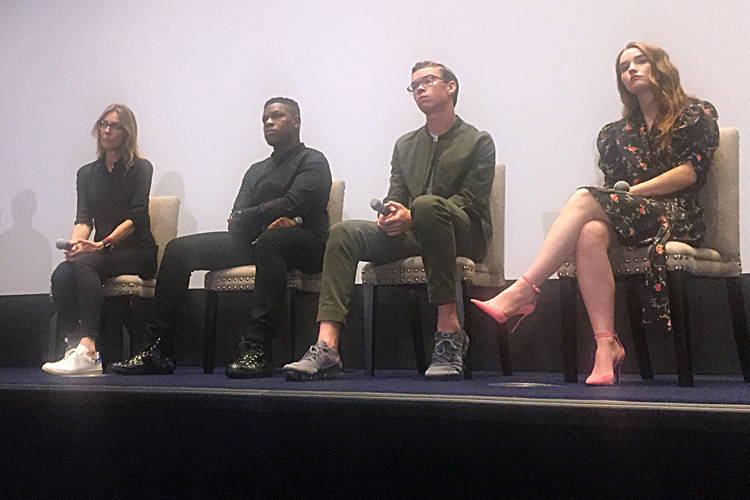The following questions and answers are excerpted from a conversation that followed the NBR screening of Detroit.
When you first read the script and found it to be based on a real event, what was your reaction?
John Boyega: I think I was just a bit shocked that I didn’t know about this specific event. I knew about rebellion in Detroit, but I didn’t know about the Algiers Motel, so that was an education. On top of that I felt like this is something that would spark conversation at a time when we are still discussing the same topics and having the same issues. I felt like we had to do it.
Will Poulter: I don’t think I’ve ever read a screenplay that was so viscerally raw. Of course I knew that with Kathryn’s guidance it was going to be more effective and more authentic. It was really disturbing to see parallels exist between the present day and 1967, but of course also exciting since you get to be part of something socially powerful.
Kaitlyn Dever: When I first found out I was going to be part of this film, I didn’t know anything about the Algiers Motel incident. When I told people about this story and they didn’t know either I think that’s when I realized why a film like this needed to be made.
“By humanizing the event, people better understand what happened and then can have a conversation about it.”
The approach comes across as a blend of documentary and narrative storytelling. What was your thought process in making the decision to blend these elements?
Kathryn Bigelow: It was a process of discovery. In the research phase, I actually had about 2,500 still images from the riots. In discovering those images, I felt that the emphasis on reality was so critical in this piece and that the audience should have a completely immersive experience. What was important to me was that the feeling would be that of empathy for these young African American men who live through a night of such terrible police brutality and racial injustice. I wanted to make that as real as humanly possible, so the camera is very present: The set was arranged in almost a 360-degree way so that it was active with the environment to give the actors something to work with. The camera was never locked into a close-up, instead it was fluid, so it felt very real. The good news is that they’re reenacting that moment emotionally and it has an emotional effect in turn. By humanizing the event, people better understand what happened and then can have a conversation about it.
For a character that is easily perceived as a monster, how did you go about humanizing your character?
Poulter: He’s probably as close as humanely possible to a monster in my opinion. It was important to humanize him because his character wasn’t a cosmic source of evil or vessel for some sort of supernatural hatred, he represents very real characters that unfortunately share a similar outlook on life. It’s utterly tragic that he wore a uniform and treated people the way that he did.
What was it like as an actor getting into some of the more difficult scenes and having to repeat those emotions over several takes?
Boyega: It is a pleasure to be in a role that has real emotion behind it. There was something powerfully unifying about the fact that we were all collaborating, even though it got intense sometimes because of the content. I stayed isolated from a lot of the process on set because I wanted the camera to catch me genuinely reacting. I wanted to be caught with an absolute and genuine emotion. I think that gave the energy that was needed.
Dever: I think I was more a reactor to the aggression. The main thing for me is that it’s an amazing opportunity to be part of a story like this, though this is the toughest thing I’ve had to do as an actor. At the same time, it’s not nearly as terrifying as it was for the people who lived through it. It was a challenge, but easy to work with all of the other talented people on this film.
How did you use music to shape the emotional arc of the film?
Bigelow: There were so many big elements in the screenplay and Motown music is Detroit, so you can’t have one without the other. It was important to find a way to look at these characters individually and look at how music saves them, heals them, and is the source of every kind of a pain. I think Mark did a wonderful job of baking that into the story.

